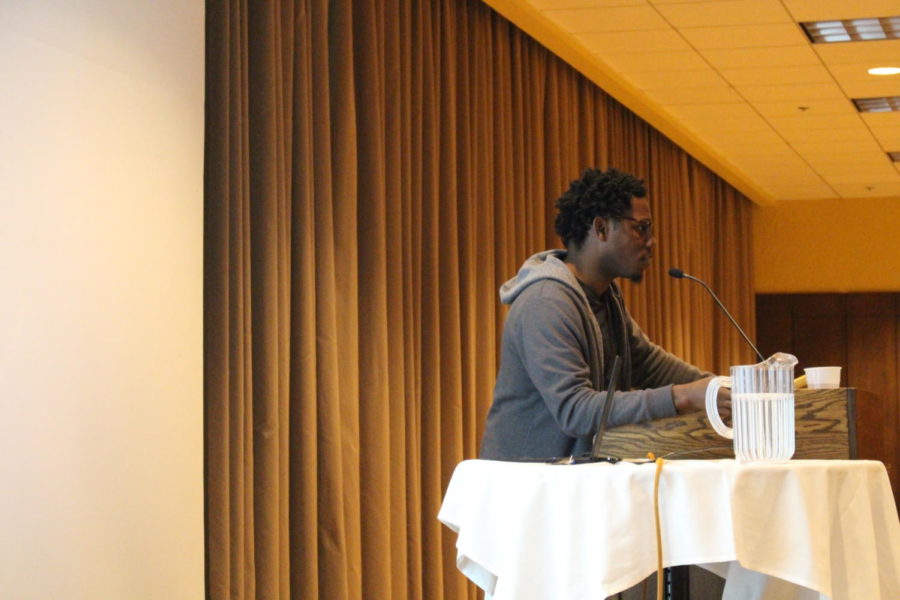Modernizing relocation services: using technology to help refugees
Derek Smith, a caseworker at the International Rescue Committee in Dallas, Texas, speaks about the app he created for helping refugees once they arrived to the United States. This event took place in the Sun Room of the Memorial Union April 2.
April 2, 2018
Coming to the United States can be an overwhelming and scary experience.
One may lack knowledge of the culture of the country they seek asylum in, not speak the language or may even lack the connections to obtain basic necessities like a job or place to live. This is still better than the potential fear of death or persecution they face in their native countries.
Derek Smith, a caseworker at the International Rescue Committee in Dallas, Texas, and developer of The Collective for Refugees and Immigrants spoke about his work with the International Rescue Committee as well as his experience developing his app to serve refugees.
The Collective for Refugees and Immigrants is a community sourced app offered in multiple languages that provides a database of useful information for refugees who come to the United States.
The app currently features the languages English, Arabic, Farsi, Kinyarwanda and Kiswahili, and it is available on both Android and iOS devices.
Smith believes there is modernization needed in the way that refugee resettling organizations interact with their clients that can greatly improve the self sufficiency of refugee communities.
“Another gap in the services that are provided or just the way that we approach helping our clients become more self sufficient is kind of outdated,” Smith said.
Smith works with refugees for a 90 day period after they come from the country, with activities including driving refugees from the airport to helping them get immunization shots and housing, among other services.
As he continued his work, Smith encountered problems with the 90 day time frame, as well as his clients’ inability to access him on weekends. Smith had experiences where families had major health emergencies and were unable to contact him to obtain the proper resources they needed in these times of crisis when he was not available.
Alongside the limitations of his work, Smith noticed increasing hostility towards immigration, saying that at times his organization faced protests outside of their workplace, and faced a lawsuit from the state of Texas.
Smith said that much of the hostility he has witnessed and experienced, while often islamophobic in nature, finds itself directed more at Arabic populations than Islamic populations.
“The argument seems to be that it’s Islamophobia, and I would actually say on the contrary that it’s really Arabophobia,” Smith said.
Smith spoke of his experience working with a large group of East Asian Muslims who experienced little additional mistrust when compared to Muslim populations in Syria and Iraq.
“There’s definitely a double standard in the way that Muslims are treated, and I just don’t believe it’s really a matter of being Muslim, it’s a matter of being Arab,” Smith said.
Smith also detailed an outline for what he hopes his app could potentially become in the future. He hopes to further diversify the apps for different language groups and demographics, as well as exploring open sourcing. Smith hopes to perfect the app in his home city of Dallas before attempting to expand on a larger scale. Smith has plans to keep the application nonprofit going forward.







